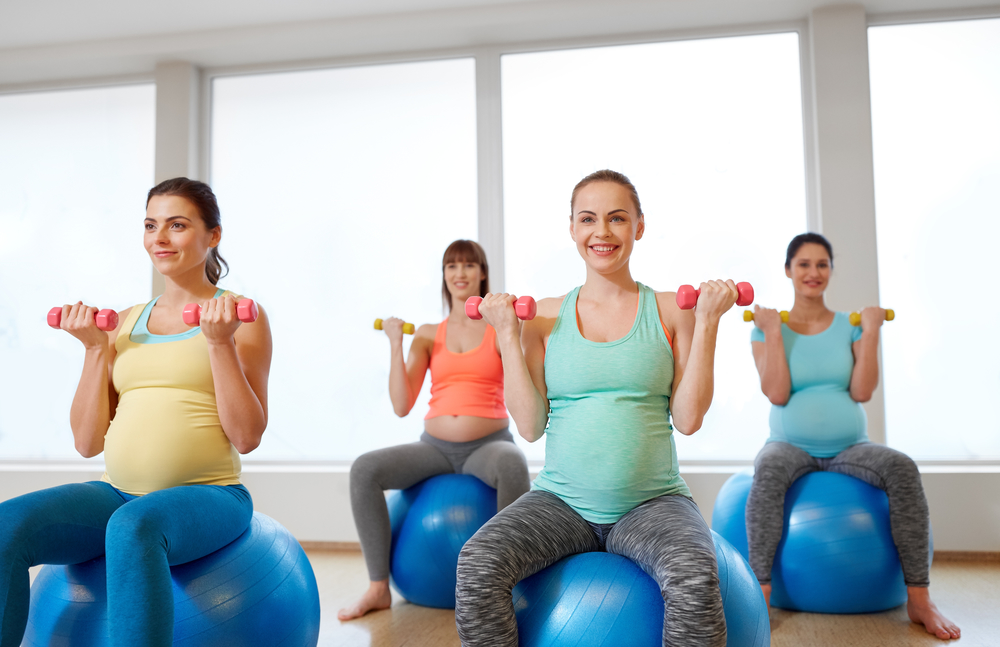Tips on keeping motivated to exercise during your pregnancy, how to optimise your exercise, and exercise for different stages of your pregnancy. by Lorraine from PregnancyExercise
 5 Tips to keep you Motivated to Exercise during Your Pregnancy
5 Tips to keep you Motivated to Exercise during Your Pregnancy
1: Babies are smaller
Babies born to mums who exercise regularly are smaller by approx. 100-200grms but this does not affect any future growth. Women who may be predisposed to carry a big baby should exercise often.
2: Reduce restless leg syndrome
Exercising during your pregnancy will reduce ‘Restless leg syndrome’
3: Better birthing positions
Mums who Exercise during pregnancy can choose better suited birthing positions, can cope with long labours if needed to and recover up to 50% faster than non-exercising females.
4: Reduced diactasis recti
Safe and effective exercise during pregnancy will reduce diastasis recti– abdominal separation. This condition leads to back pain post pregnancy and a post baby tummy that won’t go away.
5: Listen to your body
It’s important to rest and relax during your pregnancy. From the start listen to your body you will then know when to rest, exercise and sleep
8 Quick Pregnancy Exercise Tips
1. You need to stay hydrated during your pregnancy. Aim to consume 1.8-2 litres of water a day, more if you are exercising.
2. Reduce your pre pregnancy exercise levels by 10% during your 1stTri-mester, approx. 15-20% second Tri-mester and approx. 30% in your last Tri-mester.
3. Wear exercise clothing that is comfortable. Clothing that is too tight will increase lower abdominal discomfort.
4. You don’t have to purchase a heart-rate monitor to exercise safely during your pregnancy. By listening to your body you will stay in your aerobic zone which is 70-75%- for more information on the correct intensity to exercise at during pregnancy check out my video link.
5. It is best if weight gain bothers you to stay away from the scales during your pregnancy and put your skinny jeans to the back of your wardrobe for a short while.
6. Placing a pillow under your knee from as early as 12 week can help reduce back and hip pain.
7. If you are managing to exercise regularly during your pregnancy it is best to take a week off and rest every 8 weeks.
8. Exercise will help improve your pregnancy posture which will give your baby more room to grow and move and make you feel more comfortable.
Pregnancy Weeks 5-14 tips
Hopefully these tips will help you through one of the most testing times during your pregnancy, the first 12 weeks.
Reduce your daily exercise levels by 20%
As examples, if you normally walk for an hour a day just do 40 minutes, at the gym again reduce your duration.
You don’t need to purchase a heart-rate monitor
If you listen to your body it is almost impossible to exercise too hard. If you do push yourself too hard your heart-rate accelerates very quickly and you will become puffed and may feel asthmatic. This rapid increase forces you to slow down. You cannot push yourself too hard during pregnancy; your body will not let you. Listen to your body and you will stay in the correct training zone of 70-75% intensity.
Rest and Relax
You may find that during some weeks in this phase (often weeks 6-10) you feel that nauseous and tired that you can’t exercise, don’t worry it will pass and your energy levels will return. Get back into your exercise when you feel you are ready.
If you exercise moderately during your 1stTri-mester and listen to your body the second Tri-mester will feel much better and you will look good and feel great Pregnant!
Pregnancy Weeks 14-24:
From 14 weeks you should start to feel yourself once more as the first Tri-mester hangover is over! For some of you pregnancy sickness may unfortunately continue. If this is the case you still need to rest and just do what exercise you can. Exercise will help reduce both tiredness and sickness as well as cutting out sugar.
How much Exercise should I do?
You can now exercise 4-6 times a week if you have the time. I still recommend no more than 45-60 minutes of exercise a day unless you are an ex athlete and you can manage up to 90 minutes without getting too tired. 45-60 minutes is enough, if you do get tired reduce the duration of your exercise and take an extra day off.
Rest and Listen to your body.
During my pregnancies I noted and diarised everything. I found that you tend to feel good for 2 weeks then you have a week when you feel quite tired. Note how you feel each week and rest more on the weeks when you feel tired
Low Iron Levels
If you find you are continuously tired you may be low in Iron. Babies demand more iron around weeks 13 and 20. If you do feel like this talk to your LMC and get an earlier blood test if you think necessary.
Pregnancy Weeks 24-34:
This may be this best time during your pregnancy so enjoy it. You are not pregnant for long and as soon as you give birth you will forget all about your pregnancy.
Make the most of all the nice comments you are hopefully receiving.
Pregnancy Posture
Your body shape is now changing very fast; you should now start to look pregnant. This can put many more demands on your posture. Try to maintain good posture as this will help you carry your pregnancy more efficiently and give your baby much more room to grow and move.
Diabetes-Blood glucose test
This blood test is usually required around weeks 26-28. Try to get an early morning appointment preferably before you have eaten breakfast. Food will affect the results especially foods containing sugar so the test results may be inaccurate and you will have to go for another test.
If you can’t get your blood test prior to eating try to eat foods that are high in protein and fat and preferably 2 hours before.
These foods will have less of an effect on the results eggs, nuts, avocado. Foods that will spike the blood test orange juice, sugar, fruits and dried fruit, cereal.
Exercise for this Phase
You will find that you can still manage to exercise 3-5 times a week. Swimming, walking and specific pregnancy exercises that will strengthen your glutes and leg strength are very important during this stage in your pregnancy.
Pregnancy Weeks 34-40+:
If you haven’t slowed down so far you will have try to during these last few weeks of your pregnancy. The best time to exercise will be in the morning when you have the most energy. You may need to rest most afternoons, try to make sure you do. Keep listening to your body.
You may even find that you sleep for 2 hours straight a couple of times a week during weeks 38-40: a sign that baby is getting ready.
Optimal Baby Position
The most important factor if you wish to have a natural birth or use as few interventions as possible is to get and keep your baby in the optimal position for birth. Head down and Anterior facing (babies head is facing in towards you) known as Left or Right Occipito Anterior (LOA OR ROA) are the optimal birthing positions.
You don’t want your baby to be posterior, transverse or breech these positions may need you to require a caesarean section or have many medical interventions.
Positions to Avoid
Certain postural positions can favour poor birthing positions. Sitting down in a chair for long periods, and supporting spinal flexion with an increased posterior tilt (pelvis tucked underneath you) will increase posterior and breech positions.Try to avoid:-
- Sitting with your legs crossed
- Slouching in a chair- instead turn the chair back to front and stick your bottom out
- Lying on a couch with your feet up out in front of you- Instead try to lie on your side with a cushion between your knees
- Avoid sleeping on your back
- Avoid long car journeys
Positions that will help:
- Have your knees lower than your hips at all times
- Keep your body-weight forward when seated. When you are sitting, turn a chair the wrong way round and lean forward from your hips. Try this at your desk, in meetings or out at a cafes with friends.
- Watching the T.V at night? Lean over a Swiss ball or onto a bean bag or do pregnancy yoga stretches or your birthing exercises.
- Sleep on your left side, making sure you have a pillow under your knee
Lorraine Scapens
Lorraine is a Personal Trainer and Corrective Exercise Specialist with 20 years experience training pregnant and post natal women. She has specialized in Pregnancy and Post Natal Exercise for more than 15 Years. Her websites are Pregnancy Exercise and Turning Baby, and you can read her blog here. She is also on Facebook, Twitter and YouTube. You can contact her at lorraine@pregnancyexercise.co.nz. To see all of Lorraine’s articles, click here.
Disclaimer: This information is general advice only, and you are advised to discuss any concerns you may have with your GP or midwife, or before starting a new exercise regime. Lorraine is not able to provide you with medical advice. You cannot hold Lorraine liable in any way for injuries that may occur whilst training.

 5 Tips to keep you Motivated to Exercise during Your Pregnancy
5 Tips to keep you Motivated to Exercise during Your Pregnancy











